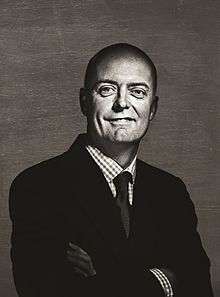Roger Reed
Roger Charles Reed FREng FIMMM is a Professor of Engineering Science and Materials at the University of Oxford.[3] He works at Oxford's Begbroke Science Park, and is associated with its Departments of Engineering Science and Materials.[3] He is a Fellow at St. Anne's College, Oxford.[4][2][5]
Roger Reed | |
|---|---|
 Roger Charles Reed in 2016 | |
| Born | Roger Charles Reed November 1965 (age 54)[1] |
| Nationality | British |
| Alma mater | University of Cambridge (BA, PhD) |
| Awards | Canada Research Chair |
| Scientific career | |
| Fields | Engineering Materials Science Superalloys Nickel[2] |
| Institutions | Imperial College London University of British Columbia University of Birmingham |
| Thesis | The characterisation and modelling of multipass steel weld heat-affected zones. (1990) |
| Website | www |
Education
Reed was educated at the University of Cambridge, where he was awarded a PhD in 1990 for research on multipass steel.[6][4]
Career and research
Reed has held academic positions at Imperial College London, the University of Cambridge, the University of British Columbia (UBC), where he held a Canada Research Chair.[7] During the period 2006 to 2012 he worked in the Dept of Metallurgy and Materials at the University of Birmingham, where he acted as Director of Research. He moved to Oxford in 2013.[3] He holds a visiting position at the Max Planck Institute for Iron Research.[3]
In 2017, Reed and his collaborators founded the University spin-off company OxMet Technologies Ltd to commercialise some aspects of his research group’s efforts at the University of Oxford.[1][8]
Reed's research is focused on high temperature materials and nickel-based superalloys for use in jet engines and for generating power.[9] Reed has also researched deformation mechanisms in single crystal superalloys under various mechanical fatigue conditions; phase transitions and oxidation reactions; as well as quantitatively studying process modelling for welding and forging.[9] His book The Superalloys: Fundamentals and Applications was published in 2006.[10]
Awards and honours
Reed was elected a Fellow of the Institute of Materials in 2005,[11] a Fellow of ASM International in 2001,[12] and Fellow of the Royal Academy of Engineering (FREng) in 2017.[13][14][15]
References
- "OxMet Technologies Ltd - Directors". companieshouse.gov.uk. Companies House. Retrieved 8 September 2017.
- Roger Reed publications indexed by Google Scholar

- "Roger Reed". University of Oxford. Retrieved 8 June 2016.
- "Academic Profile: Professor Roger Reed". St Anne's College, Oxford. Retrieved 8 June 2016.
- Rae, C.M.F.; Reed, R.C. (2001). "The precipitation of topologically close-packed phases in rhenium-containing superalloys". Acta Materialia. 49 (19): 4113–4125. doi:10.1016/S1359-6454(01)00265-8. ISSN 1359-6454.
- Reed, Roger Charles (1990). The characterisation and modelling of multipass steel weld heat-affected zones. jisc.ac.uk (PhD thesis). University of Cambridge. OCLC 556603518. EThOS uk.bl.ethos.334220.
- "UBC nets brain gains with latest research recruits". UBC News Digest. University of British Columbia. April 2002. Retrieved 8 June 2016.
- "Companies Formed". Oxford University Innovation. Retrieved 8 September 2017.
- "Humboldt Research Award goes to material scientist Professor Roger Reed". Max Planck Institute. 12 December 2012. Retrieved 8 June 2016.
- Reed, Roger C (2006). The Superalloys: Fundamentals and Applications. Cambridge University Press. doi:10.1017/CBO9780511541285. ISBN 9780511541285.
- "Prof. Roger C. Reed of University of Birmingham Visits IMR----Institute of Metal Research, Chinese Academy of Sciences". english.imr.cas.cn. Retrieved 9 June 2016.
- Zion, Joseph. "ASM International Names 26 New Fellows" (Press release). ASM International. PRWeb. Retrieved 9 September 2017.
- "50 leaders in engineering elected to Academy Fellowship". Royal Academy of Engineering UK. 5 September 2017. Retrieved 8 September 2017.
- "Four Oxford researchers awarded Royal Academy of Engineering fellowships". University of Oxford. 6 September 2017. Retrieved 12 September 2017.
- "Professors Eleanor Stride and Roger Reed elected Fellows of the Royal Academy of Engineering". Department of Engineering Science, University of Oxford. 5 September 2017. Retrieved 8 September 2017.